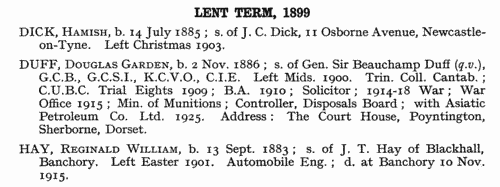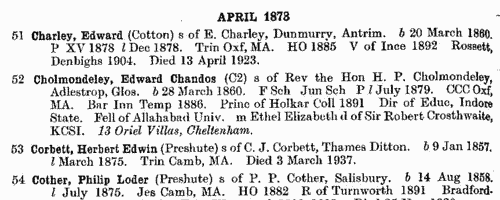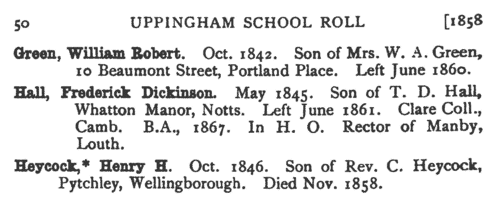D'orsey Surname Ancestry ResultsOur indexes 1000-1999 include entries for the spelling 'd'orsey'. In the period you have requested, we have the following 6 records (displaying 1 to 6): Buy all | | | Get all 6 records to view, to save and print for £32.00 |
These sample scans are from the original record. You will get scans of the full pages or articles where the surname you searched for has been found. Your web browser may prevent the sample windows from opening; in this case please change your browser settings to allow pop-up windows from this site. Boys entering Trinity College, Glenalmond
(1847)
Trinity College, Glenalmond, Perthshire, was originally founded as a college at which young men might be trained for the ministry of the Scottish Episcopal Church, and the sons of the laity might be educated and brought up in the faith and tradition of the Church. In 1876 the Theological College was transferred to Edinburgh, Glenalmond remaining as a boys' school. This second edition of the school register, edited by G. St Quintin, was published in 1955, incorporating the text of the first edition prepared by E. W. Neish. The scholars are listed by term of entering the school, and then alphabetically by surname; the details then given are full christian names, date of birth; name of father; any distinctions within the school; and then a career synopsis, with date and place of death where known. D'ORSEY. Cost: £6.00.  | Sample scan, click to enlarge

|  Persons of standing recommending London police recruits
(1843-1857) Persons of standing recommending London police recruits
(1843-1857)
The Metropolitan Police Register of Joiners (MEPO 4/334) lists policemen joining the force 1 January 1843 to 1 April 1857 (warrant numbers 19893 to 35804). The register is alphabetical, in so far as the recruits are listed chronologically grouped under first letter of surname. It gives Date of Appointment, Name, Number of Warrant, Cause of Removal from Force (resigned, dismissed, promoted or died), and Date of Removal. Although the register was closed for new entrants at the end of 1842, the details of removals were always recorded, some being twenty or more years later. Those recruits not formerly in the police, the army, or some government department, were required to provide (normally) at least two letters of recommendation from persons of standing, and details of these are entered on the facing pages. Where a recruit was only recently arrived in the metropolis, the names and addresses of the recommenders can be invaluable for tracing where he came from. Those recruits not formerly in the police, the army, or some government department, were required to provide (normally) at least two letters of recommendation from persons of standing, and details of these are entered on the facing pages: the names in these are indexed here (the police recruits are indexed separately and not included here). Recruits transferred from other forces or rejoining the force did not normally need recommendations - in the latter case, former warrant numbers are given - but some recommendations are from police inspectors, even other constables. Recruits coming from the army sometimes have general military certificates of good conduct, but most often have a letter from their former commanding officer; recruits recommended by government departments (most often the Home Office) similarly have letters from the head of department. But the great majority of the names and addresses in these pages are of respectable citizens having some sort of personal acquaintance with the recruit. Where more than two recommendations were provided, the clerk would only record one or two, with the words 'and others'. Tradesmen are sometimes identified as such by their occupations; there are some gentry. Although the bulk of these names are from London and the home counties, a scattering are from further afield throughout Britain and Ireland. D'ORSEY. Cost: £8.00.  | Sample scan, click to enlarge

| Boys entering Marlborough College
(1860)
The public school at Marlborough in Wiltshire was founded in 1843. In 1952 this, 9th, edition of the college register was published, being a revision by L. Warwick James of the 8th edition (of 1936): but for the years before 1936 it does not merely repeat the 8th edition, because Warwick James was able to correct the 19th-century entries with information from newly-discovered letters and books from 1843 to 1853, and the school lists from 1844 onwards. The roll is arranged by year, and within each year by term of entrance, and then alphabetically by surname within each term. Each boy is assigned a number within the year: then his name is given, surname first, and, in brackets, where a boarder, his house. The houses within the college were called B1, B2, B3, C1, C2 and C3, and the Lower School (L Sch); the out college houses were Preshute, Priory, Cotton, Hermitage, Littlefield, Barton Hill, Summerfield and Upcot. Then there is given the boy's father's name (surname and initials) and address (at entrance), the boy's date of birth (b) and month of leaving (l). Where the boy represented the school at Rugby football (XV) or cricket (XI), in the rifle corps (VIII, or RC XI), that is indicated. There is a brief summary of achievements in later life, and, where known, and date of death or (in italics) address as in 1952. D'ORSEY. Cost: £4.00.  | Sample scan, click to enlarge

| Boys entering Uppingham School
(1862)
The public school at Uppingham in Rutland was founded by Archdeacon Johnson in 1584. A roll of scholars from 1824 to 1905 was edited by J. P. Graham, and published in 1906. This was a revision and updating of an 1894 edition of the roll, the great bulk of the work having been done by Mrs Mullins. The roll is arranged by year, and within each year by term of entrance, and then alphabetically by surname within each term. Each boy's name is given, surname first, with an asterisk where known (in 1906) to have died. Then there is month and year of birth, father's name (most often just surname and initials) and address (at entrance). Where the boy represented the school at Rugby football (XV) or cricket (XI), that is indicated. After the month and year of leaving the school, there is a brief summary of achievements in later life, and, where known, address as in 1906. D'ORSEY. Cost: £4.00.  | Sample scan, click to enlarge

| Deaths, Marriages, News and Promotions
(1862)
Death notices and obituaries, marriage and birth notices, civil and military promotions, clerical preferments and domestic occurrences, as reported in the Gentleman's Magazine. Mostly from England and Wales, but items from Ireland, Scotland and abroad. July to December 1862D'ORSEY. Cost: £4.00.  | Sample scan, click to enlarge

| Partnerships Dissolved
(1880)
Dissolution of trading partnerships, or removal of a partner from a business, in England and Wales, January to March 1880D'ORSEY. Cost: £6.00.  | Sample scan, click to enlarge

|
Research your ancestry, family history, genealogy and one-name study by direct access to original records and archives indexed by surname.
|









